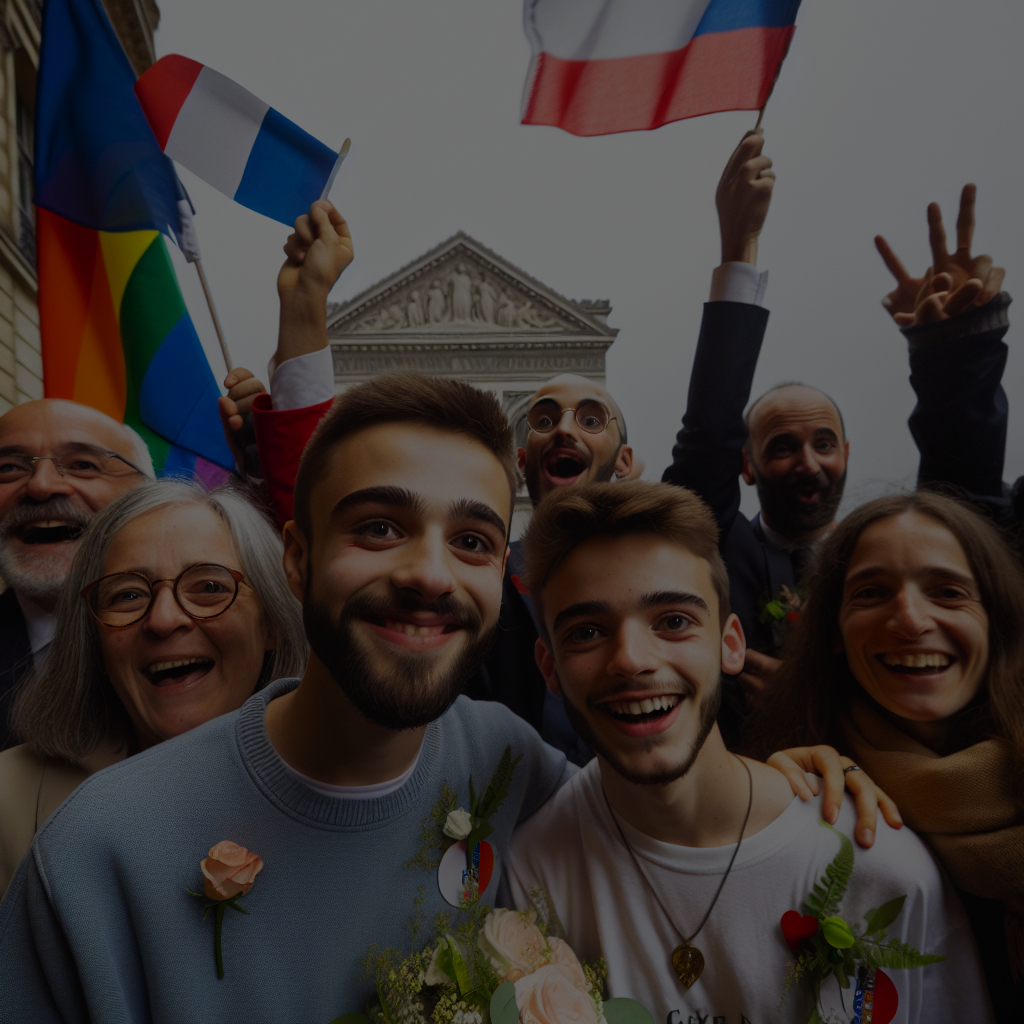Same-Sex Marriage in France : A Decade After the Taubira Law
In May 2013, France passed the historic Taubira Law, which legalized marriage for same-sex couples. Ten years later, it’s time to reflect on this milestone and assess its impact on civil rights, societal progress, and the ongoing challenges faced by the LGBTQIA+ community.
A Historic Reform: Marriage Equality in France
Named after then-Justice Minister Christiane Taubira, the law marked a major step forward for civil liberties in France. It granted:
- The legal right for same-sex couples to marry.
- Joint adoption rights for married same-sex partners.
- Legal recognition of equality between couples, regardless of gender.
The law was passed amidst significant controversy, with large-scale demonstrations led by the Manif pour tous movement opposing the reform. Nonetheless, the law was officially enacted on May 17, 2013 — fittingly, the International Day Against Homophobia and Transphobia.
Ten Years Later: Key Statistics
According to INSEE and the Ministry of Justice, since the law’s adoption:
- More than 70,000 same-sex marriages have been performed in France.
- Same-sex unions currently represent about 3% of all marriages annually.
- The numbers are nearly balanced: 55% between men, and 45% between women.
These figures highlight how same-sex marriage has become an integrated part of modern French society.
Public Opinion Over Time
Back in 2013, public opinion was divided — only 53% of French citizens supported marriage equality. Today, however, support has grown significantly, with nearly 75% of the population approving same-sex marriage. A majority are also in favor of adoption and assisted reproductive technologies (ART) for all women.
This shift is largely generational: younger adults overwhelmingly support LGBTQ+ rights, while resistance remains more common among older age groups.
Positive Impacts of the Law
- Increased visibility for same-sex couples
Legal marriage has helped normalize LGBTQ+ partnerships in both public life and legal institutions. - Legal security
Previously, same-sex couples had to rely on civil unions (PACS), which didn’t offer the same rights related to inheritance or parenting. - Family recognition
Marriage and adoption rights have helped legitimize same-sex families and protect the rights of their children.
Ongoing Challenges
Despite real progress, several obstacles remain in the fight for full equality:
- Access to assisted reproduction (PMA): Legal since 2021, but still difficult to obtain due to long waiting times and procedural hurdles.
- Surrogacy (GPA): Still banned in France, sparking debate — particularly among male couples seeking to start families.
- Ongoing discrimination: LGBTQIA+ people in France continue to face verbal and physical abuse. Reports of homophobic incidents have risen in recent years.
- International recognition: Not all countries recognize same-sex marriages performed in France, causing legal complications for binational couples.
Looking Across Europe: How France Compares

France was one of the first major European countries to legalize marriage for same-sex couples. Still, others have taken further steps since:
- Spain and Portugal: Early adopters of both marriage and adoption rights.
- Germany: Introduced same-sex marriage in 2017.
- Netherlands: Pioneered marriage equality in 2001.
- Italy: Still only allows civil unions — not full marriage rights for same-sex couples.
France now falls into a mid-range category when it comes to LGBTQ+ rights in Europe, particularly due to its restrictive stance on surrogacy and struggles to end homophobic discrimination.
Personal Experiences and Social Impact
For many spouses in same-sex marriages, the law has been transformative:
- A powerful symbol of equality and acceptance.
- A source of legal and emotional security for children in LGBTQ+ families.
- A meaningful step toward a more inclusive society.
However, others point out that beneath the surface of legal equality, latent homophobia remains a persistent issue in French society, limiting full acceptance.
Conclusion: Still a Work in Progress
Ten years on, same-sex marriage is firmly established in France. The Taubira Law stands as a landmark victory for equality and human rights. Yet, with ongoing debates surrounding ART access, the prohibition of surrogacy, and the persistence of violence against LGBTQIA+ individuals, the fight for full and genuine equality continues.
The progress achieved is undeniable and deeply meaningful, but the journey toward a fully inclusive society is not yet over.
Ten years after marriage equality became law, France stands at a crossroads: proud of how far it has come, yet aware of the road still ahead. Amid ongoing challenges and evolving public attitudes across Europe, France must continue to push forward — not just with legislation, but with a deeper cultural shift toward acceptance and equality for all.




Deja una respuesta